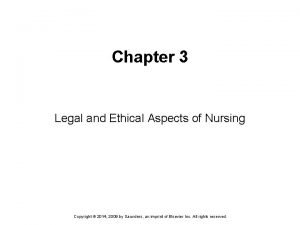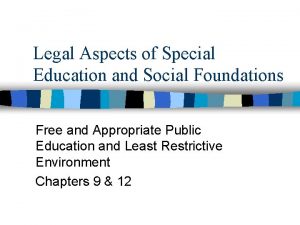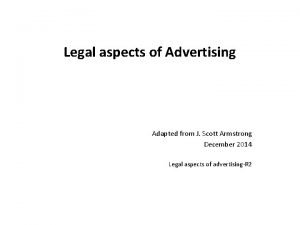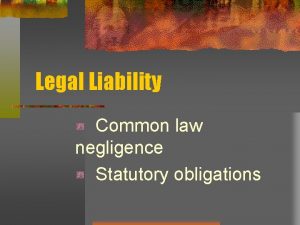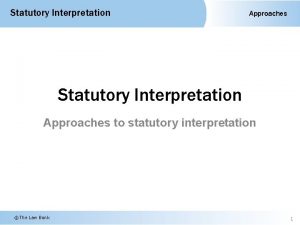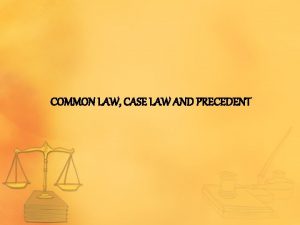Legal Aspects DEFINITIONS Statutory law Common case law








- Slides: 8

Legal Aspects • DEFINITIONS – Statutory law – Common (case) law – Public law and Private law – Criminal law and Civil law

Criminal law comprises laws that affect the whole of society a Crime is an act in violation of criminal law made with criminal intent Actus reus (criminal act) refers to either an act that the law forbids or an omission of an act that the law requires. Mens reas (criminal intent) refers to the state of mind of the person who commits a criminal act.

Civil law • Civil law is law that affects the individual rather than the whole of society. a Tort is a wrongful act committed against another person.

The concept of medical (health care) law • Branch of law concerned with the relationship between healthcare professionals (as well as healthcare institutions such as hospitals and other public bodies) and patients • Concerned with many areas of law, notably tort, criminal, public and administrative law, and family law. • Ethical issues, and those concerning human rights, permeate all the problems that arise in medical law

Professional Negligence • Negligence – conduct that falls short of the standard expected of a person where a duty of care is owed and which causes foreseeable damage to another person – the duty applies to both acts and omissions. “We must take reasonable care to avoid acts and omissions which you can reasonably foresee would be likely to injure your neighbour”…. . ” • Lord Atkin in Donoghue v Stevenson (1932)

Professional Negligence In order to establish negligence (or malpractice) on the part of a health care professional, a patient must prove (on the balance of probabilities): – Duty - that a duty was owed to the patient (plaintiff) in the particular situation; – Breach - that the professional (defendant) breached this duty in failing to conform to the standard of care required by the law; – Causation - that the patient suffered harm (that was not too remote) as a result of the defendant’s actions.

Professional Negligence • Well established in English law that a duty of care exists between health care professionals and their patients. • The duty of a health care professional is to exercise reasonable care and skill. • The standard of care required by law was outlined in the leading case of Bolam v Friern Hospital Management Committee (1957) by Mc. Nair, J: “The test is the standard of the ordinary skilled man exercising and professing to have that special skill. ”

Professional Negligence • Negligence that is so severe as to warrant punishment under criminal law is described as gross negligence. • If a patient dies as a result of negligent treatment, a health care professional could face criminal prosecution. • The prosecution must prove (beyond reasonable doubt) the two elements of the actus reus (guilty act)and the mens rea (intention, recklessness or negligence).
 Statutory and non statutory welfare measures
Statutory and non statutory welfare measures Legal aspects of catering premises
Legal aspects of catering premises Legal aspects of software engineering
Legal aspects of software engineering Legal aspects of doing business in canada
Legal aspects of doing business in canada Chapter 3 legal and ethical issues
Chapter 3 legal and ethical issues Legal and ethical issues in information security
Legal and ethical issues in information security Legal aspects of special education
Legal aspects of special education Legal aspects of advertising
Legal aspects of advertising Manajemen pembangunan proyek
Manajemen pembangunan proyek




